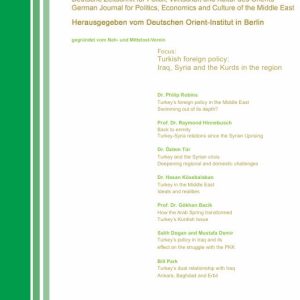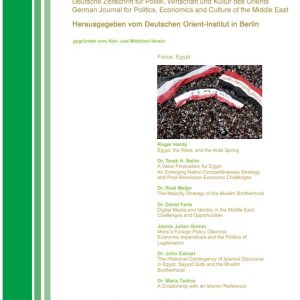Shop
Showing 17–32 of 349 resultsSorted by latest
-

Agents of change: Civil society in post-revolutionary Tunisia
7,90 €incl. VAT
Add to basket -

The Arab Uprisings and the political trajectories of Morocco, Algeria and Tunisia
7,90 €incl. VAT
Add to basket -

Turkey’s Dual Relationship with Iraq: Ankara, Baghdad and Erbil
7,90 €incl. VAT
Add to basket -

Turkey’s policy in Iraq and its effect on the struggle with the PKK
7,90 €incl. VAT
Add to basket -

How the Arab Spring Transformed Turkey’s Kurdish Issue
7,90 €incl. VAT
Add to basket -

Turkey and the Syrian Crisis: Deepening Regional and Domestic Challenges
7,90 €incl. VAT
Add to basket -

Turkey in the Middle East: Ideals and Realities
7,90 €incl. VAT
Add to basket -

Back to Enmity: Turkey-Syria Relations Since the Syrian Uprising
7,90 €incl. VAT
Add to basket -

Turkey’s foreign policy in the Middle East Swimming out of its depth?
7,90 €incl. VAT
Add to basket -

Orient I 2015 – Focus: Turkish foreign policy: Iraq, Syria and the Kurds in the region
26,00 €incl. VAT
Add to basket -

Public Health Workforce Strengthening in the Eastern Mediterranean: EMPHNET’s Strategic Contributions
7,90 €incl. VAT
Add to basket -

Health systems in the Gulf Cooperation Council (GCC) countries: A comparative analysis for evidence-based policy and planning
7,90 €incl. VAT
Add to basket -

Health Systems and Gender-Based Violence in MENA: The Case of Morocco in Regional Perspective
7,90 €incl. VAT
Add to basket -

Challenges of Medicine in the Arab and Global Context – Women’s Health and Empowerment as Key Priorities
7,90 €incl. VAT
Add to basket -

Orient III 2025 – Focus: Health Systems and Public Health Challenges in the MENA Region
26,00 €incl. VAT
Add to basket -

Orient I 2013 – Focus: Egypt
26,00 €incl. VAT
Add to basket




